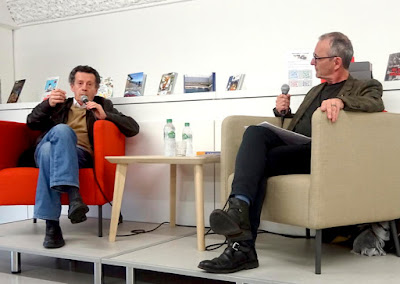Friday, April 27, 2018
COUSCOUS-POMMES FRITES
I'm a glutton for punishment.
The first time I was at an interview in the Alliance Française I arrived more or less by accident. I have recounted this in an earlier post. I was down the back in the café where they used to hold the functions so I didn't hear everything and of what I heard I didn't understand a lot. Why don't those Frenchies speak slower?
This one was in the refurbished library/médiatheque where the functions are now held and I made sure to get me a front seat. I still didn't understand everything by a long shot. It didn't help that I had done no research on either Hédi Kaddour or Michael Cronin who was interviewing him.
The session was introduced by Thierry Lagnau, the Director of the Alliance, who was clearly pleased to have this famous novelist on the premises to be interviewed by a serious academic.
Before the interview started there was a vote by acclamation on whether it should be in French or English and the French won hands down.
Hédi is of mixed Tunisian/French origin. As he explains it, his mother was a "pied noir" from Algeria and his father was Tunisien. Hédi spent a significant part of his life in Tunisia and in Morocco. He describes himself as a "couscous-pommes frites", an expression I had not heard before but which is very evocative. And it is honest. I don't think Jacques Attali would take too kindly to the term. An interesting difference between the two men. Apart from being a poet and a novelist, Hédi is a translator of English, German and Arabic. So he was bringing quite a lot to the table.
Michael is 1776 Professor of French in TCD and he has an abiding interest in all aspects of translation. His CV, linked above, is a mile long.
You can pursue the links above to get the full picture but I will just mention a few points that struck me from among the bits I understood.
Hédi made a distinction between a reporter/ournalist on the one hand and a poet/novelist on the other. He saw the former as having a point of view to put across, whereas the latter is more like a window pane, putting the reader in touch with reality and remaining invisible himself.
He warned against amnesia; history, he felt, informs (éclaircit) the present and is ignored at our peril.
There was a thread on colonialism through his comments and I am just sorry I wasn't up to following it. His most recent novel Les Prépondérants deals with this in some detail and you can see him talking about it on Youtube. Well worth a watch.
He had an interesting point about stealing metaphors. You can rarely use the same metaphor in a translation as in the original text. But what if you were to make it a practice generally to import metaphors from a foreign language into your own. A constant process of enrichment. No difficulty for an Irishman understanding this one, given imports from Irish into Hiberno-English.
Michael asked him how he saw Beckett? Did he read him as a French author or as an Irish author operating in French. I didn't entirely follow the ramifications of the answer but I gathered that Hédi admired Beckett but was not influenced by him.
Touching on past social injustice against women, particularly in the period in which some of his writings are set, he cited the fate of women who had entered the workforce during WWI only to have their jobs stolen by returning veterans. Then, depending on their circumstances, they had to return to domestic duties, or in the case of single women, just get along somehow.
There was a fairly extended Q&A at the end, also in French. Needless to say I did not participate. My overall contribution consisted of a bum on a seat and a tweet after the event.
Subscribe to:
Post Comments (Atom)








No comments:
Post a Comment
Bona fide comments only. Spamming, Trolling, or commercial advertising will not be accepted.